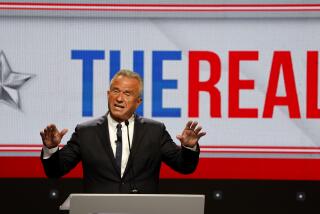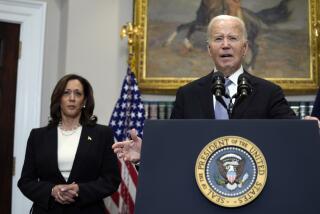The ‘other’ Democrats soldier on
- Share via
MONTICELLO, IOWA — Christopher J. Dodd walked into the City Council chambers here just before noon a week ago hoping to convince local Democrats that he was the best choice for the party’s 2008 presidential nomination. But for a message to be delivered, someone has to be on the receiving end, and on this cold, snowy morning only about 30 people had come out to hear the long-serving Connecticut senator’s pitch.
In a contrast of fortunes that illuminates a key divide in the Democratic race, just the day before, Sen. Barack Obama of Illinois drew about 250 people to a stomping, cheering 8:30 a.m. rally in a basketball-court-sized room in the same building.
Forget about former North Carolina Sen. John Edwards’ “two Americas” theme. Right now there are two Democratic campaigns -- the high-profile, celebrity-studded race being waged by Obama, Edwards and New York Sen. Hillary Rodham Clinton, and another, quieter race by Dodd, Delaware Sen. Joseph R. Biden Jr. and New Mexico Gov. Bill Richardson.
At the top, Clinton, Obama and Edwards tour Iowa with national media entourages and stride into carefully staged rooms filled with hundreds of potential caucus-goers energized by blaring rock music.
And they often have company. Talk-show host Oprah Winfrey has been here with Obama. Retired Los Angeles Lakers star Earvin “Magic” Johnson toured this week with former President Clinton. Actors Kevin Bacon and Tim Robbins campaigned with Edwards.
At the bottom, Dodd, Biden and Richardson -- sans celebrities -- rarely see more than one or two local reporters as they greet potential voters by the dozens in lawn-sign-decorated rooms small enough to fill with their unamplified voices.
Still, the lower-tier candidates soldier on, in too far to quit and emboldened by the inherent uncertainty and surprises of political campaigns.
“Iowa’s always about expectations,” Dodd said. “On the night of Jan. 3, the results come in, and if all of a sudden I’m in third or fourth place here, you’re going to have two candidates ahead of me whose campaigns may be over with because they failed expectations. . . . So all of a sudden this changes.”
But can it change enough? Surprises have happened here before. Yet the biggest challenge that the Biden, Dodd and Richardson campaigns face is finding air to breathe when Obama, Clinton and, to a lesser extent, Edwards are sucking up most of the state’s free-media oxygen.
“There is a legitimate celebrity factor that is exciting,” Biden said after a brief talk earlier this month before the Polk County Democratic Central Committee in Des Moines. “You have a woman and an African American who are serious people making a serious bid.”
Biden believes that with less than two weeks until the Jan. 3 caucuses, the media spotlight is broadening. And that will mean more exposure for him and the other lightly covered candidates, all of whom are touting their experience.
“As long as Iowans still think that Iraq is the No. 1 problem that the country faces . . . I think I’m going to be the choice of an awful lot of them,” said Biden, chairman of the Senate Foreign Relations Committee.
Yet recent polls here show that the war has faded on the list of top voter concerns, replaced by the economy and healthcare. And although 43% of respondents to a Dec. 10-13 Quad City Times poll listed experience as more important, while 35% listed “new ideas,” Obama -- a first-term U.S. senator -- had the highest support at 33%.
Of the lower-tier candidates, Richardson had 9% support, Biden 3% and Dodd 1%, tied with Rep. Dennis J. Kucinich of Ohio, who has done little campaigning here.
“The second tier is dealing with the classic vicious circle, which is that people often say to them, ‘I really like you, but I do not support you because you cannot win,’ ” said Dennis Goldford, a political analyst at Drake University, adding that “on the other side” a candidate can’t get traction without that committed support.
“They’re doing the best they can, but I think, basically, at this point, they’re hoping for someone in the first tier to collapse to try to get into that third spot,” Goldford said. “The old rule of thumb is that there are three tickets out of Iowa. Nobody who has ever finished worse than third has gotten the nomination.”
The lack of poll support isn’t because the candidates aren’t trying. Richardson aired 6,466 local television ads in Iowa through Nov. 18, the second-highest number among the Democrats, according to the Nielsen ratings company. Obama led with 8,494 ads and Clinton was third with 6,260.
Edwards remained in a statistical tie for the lead in the polls, despite ranking fifth in aired ads with 1,384; Dodd had 3,363. Biden’s cash-strapped campaign aired 677 ads, though he has picked up the advertising pace in the last week -- as have Dodd and Richardson.
Richardson’s newest ad, which began airing here and in New Hampshire on Wednesday, is the campaign’s first negative candidate ad. A reprise of some of the recent debate dialogue, the ad contrasts Richardson’s call for immediate withdrawal of all American troops from Iraq with the stances of Clinton, Obama and Edwards, who “have repeatedly said they’ll leave thousands of troops in Iraq indefinitely.”
Though the lack of media attention bothers the lower-tier campaigns, the candidates insist that it will not damage their strategies -- primarily because none believes he will come in first here.
“You have to bank on the independence of Iowa voters that are not going to be told who’s going to win and what the polls say,” Richardson said. “My goal is modest. I want to end up in the top three.”
A similar finish in New Hampshire on Jan. 8 and a second-place finish in Nevada on Jan. 19, he said, would make him a top contender.
“I want to be ready for Feb. 5,” when some 20 states vote, Richardson said after speaking to about 30 people at a Sunday house party in Fort Madison, a Mississippi River town in the southeast corner of the state. “I think that’s where I’m going to be strong.”
For Biden, a “close fourth” would keep him in the race, and he hopes a new ad buy here -- about $750,000 beginning last week -- will build some interest.
And always, the candidates court the grass roots.
This month, Biden was the only presidential contender to speak before a regular meeting of the Polk County Democratic committee -- an overflow crowd gathered at a union hall near downtown Des Moines.
The other candidates sent surrogates, such as former state Democratic chairman Gordon Fischer for Obama, and Rob Tully, another former state chairman, for Edwards.
Clinton’s surrogate? Former Vice President Walter Mondale. And when Biden and the other speakers were announced at the start of the meeting, Mondale got the biggest round of applause.
--
Times staff writer Mark Z. Barabak contributed to this report.
More to Read
Get the L.A. Times Politics newsletter
Deeply reported insights into legislation, politics and policy from Sacramento, Washington and beyond. In your inbox twice per week.
You may occasionally receive promotional content from the Los Angeles Times.









